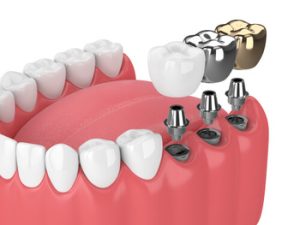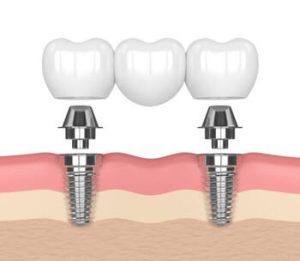Missing teeth got you bummed about your smile? Don’t worry, we’ve all been there! Luckily, there are awesome options to get your grin back on point these days. This guide will break down the two main contenders: dental implants vs. bridge.
We’ll uncover the good, the not-so-good, and everything in between to help you pick the perfect choice for your situation. Get ready to ditch the worries and say hello to a smile that makes you feel confident and ready to take on the world!
Understanding Treatments Using A Tooth Implant Vs. Bridge: The Tooth Replacement Lowdown
Let’s get down to brass tacks! Here’s the deal with these two tooth replacement options:
- Dental Implants:
- Dental Bridges: These work a bit differently. Bridges rely on the healthy teeth on either side of the gap. These surrounding teeth are fitted with dental crowns, and a false tooth in the middle connects them. But here’s the thing: bridges do have some drawbacks to consider:
- Not-So-Friendly To Neighbours: Remember how implants high-five your natural teeth? Bridges, well, they borrow from them! To place a bridge, the healthy teeth on either side of the gap must be shaved down to support the bridge structure. This can weaken these teeth and increase the risk of future problems.
- Bone Loss Blues: Bridges don’t offer the same perk, unlike implants that stimulate your jawbone. Over time, this can lead to bone loss in the jaw, which can impact your facial structure and potentially require further dental work.
- Replacement On The Horizon: Bridges typically need to be replaced every 7–10 years, while implants can last a lifetime. So, think of it as a long-term investment versus potentially needing replacements in the future.
- Cleaning Challenges: Keeping the area under a bridge clean can be trickier than plants. This means you might need to put in some extra effort with flossing to avoid buildup and maintain good oral hygiene around those supporting teeth.
Why Dental Implants Are Often The MVP When It Comes To Replacing Missing Teeth
While both implants and bridges are reputable options for replacing missing teeth, implants tend to have the best long-term benefits.
Here’s why:
High Five For Healthy Teeth
Unlike bridges that require shaving down your neighbours (the healthy teeth next to the gap), implants leave your natural teeth completely untouched. That’s a major high five for keeping your smile squad happy and healthy.
‘Jawesome’ Bone Preservation
Missing teeth can sometimes lead to bone loss in your jawbone. Implants are champs at preventing this!
They stimulate your jawbone, keeping it strong and healthy. This helps maintain your facial structure and avoids future dental dramas.
Built To Last, Built To Smile
Dental implants are like the energiser bunny of the tooth replacement world—they just keep on going! With proper upkeep, they can survive a lifetime.
Conversely, bridges typically need to be replaced every 7–10 years. So, implants might be your best bet if you’re looking for a long-lasting investment in your smile.
Natural Feel, Natural Bite
Implants feel and function like your real teeth. You can relish all your favourite meals without concern, and your speech won’t be affected either.
Bridges sometimes feel bulky and might not give you the same natural biting experience.
Flossing Like A Boss
Keeping your pearly whites clean is important; dental implants offer a breeze. Flossing around them is super easy, which helps maintain good oral hygiene and keeps your whole smile sparkling.
Bridges can sometimes be trickier to clean underneath, so maintaining top-notch oral hygiene might require extra effort.
Signs You Might Need A Dental Implant Consultation: Time To Fix That Gap!
Missing teeth can affect one’s confidence and ability to enjoy life’s simple pleasures, like biting into a juicy apple or laughing with friends without feeling self-conscious.
If you notice these signs, it might be time to talk with your dentist about dental implants.
Missing One Or More Teeth
This might seem like an obvious giveaway, but it’s worth mentioning! Even a missing tooth can impact your smile and ability to chew comfortably.
Chewing Challenges
Do you avoid certain foods because they’re too difficult to chew with missing teeth? Maybe you’ve resorted to cutting everything into tiny pieces or sticking to soft foods. This can limit your dietary choices and prevent you from getting the nutrients that your body needs.
Dental implants can restore your natural bite force, allowing you to bask in all your favourite foods without restriction. Imagine sinking your teeth into a crunchy steak or savouring a crisp apple—implants can make those simple pleasures possible again.
Shifty Teeth
Missing teeth act like party crashers in your mouth. When you have a missing tooth, the surrounding teeth can move out of place to fill the gap.
This can affect your bite and make your real teeth more susceptible to decay and gum disease. Implants act like anchors, keeping your remaining teeth in their rightful positions and preventing them from becoming misaligned.
Bridge Blues
Conversely, implants look and feel like natural teeth, and maintaining good dental hygiene is a breeze. Plus, unlike bridges that typically need replacing every 7–10 years, implants can last a lifetime with proper care.
Bone Loss Worries
Missing teeth don’t just affect your smile; they can also impact your jawbone health. When a tooth is missing, the jawbone doesn’t receive the stimulation it needs to stay strong.
Over time, this can lead to significant bone loss in the upper or lower jaw, which can affect the facial structure and even contribute to further tooth loss.
Dental implants are unique because they stimulate bone growth and help maintain a healthy jawbone. This benefits your smile, supports your overall facial structure, and prevents future dental problems.
Pain Or Discomfort
Missing teeth can sometimes cause pain or discomfort in the surrounding area. This could be due to the remaining teeth shifting or simply the irritation of the space.
Implants can address this issue by providing a stable and comfortable replacement for the missing tooth.
Self-Consciousness About Your Smile
Let’s face it: missing teeth can make you self-conscious about your smile. You might avoid smiling altogether or cover your mouth when you laugh.
Dental implants can restore your confidence and allow you to show off your smile with pride.
What To Expect When Getting Dental Implants In Australia: Your Smile Makeover Journey
Thinking implants might be the right choice for you? Here’s a quick rundown of what to expect during the dental implant process in Australia:
The Consultation Chat
First, you’ll have a consultation with your dentist. They’ll discuss your needs, goals, and any concerns you might have.
X-rays and CT scans will also assess your jawbone health and see if implants fit you well.
Treatment Plan Time
Once it’s confirmed that implants are a go, your dental expert will create a personalised treatment plan. This will include the number of implants needed, their placement, and the type of crown you’ll get.
Implant Surgery Day
The dental implant is surgically placed into your jawbone under local anaesthesia or sedation. Don’t worry; it’s done to ensure minimal discomfort!
Healing typically takes a few months for the implant to fuse with your jawbone.
Abutment Attachment
After healing, a small connector piece called an abutment will be attached to the implant.
Crowning Glory
Finally, the custom-made crown is securely attached to the abutment, giving you your brand-new tooth! Woohoo!
This is just a general overview, and the specifics of your dental treatment may vary depending on your situation and your dentist’s expertise.
Frequently Asked Questions (FAQs)
Am I a candidate for dental implants?
A consultation with a qualified dentist will determine your suitability based on your jawbone health, overall health, and any underlying medical conditions.
Is dental implant surgery painful?
Local anaesthesia or sedation is used to minimise discomfort during the procedure. You may experience some soreness or swelling after surgery, which medication can manage.
How long does dental implant treatment take?
The entire process may take a few months, depending on the complexity of the case and healing times.
How much do dental implants cost in Australia?
Can I get dental implants if I smoke?
Smoking can negatively impact healing and increase the risk of implant failure. While not an absolute contraindication, quitting smoking before and during the implant process is highly recommended.
How do I care for dental implants?
Caring for implants resembles caring for natural teeth. Brushing twice daily, flossing regularly, and attending regular dental check-ups are crucial for maintaining optimal oral hygiene and the longevity of your implants.
A Brighter Smile, A More Confident You!
Missing teeth can bring down your smile. But the good news is that there are fantastic options, like dental implants and bridges, to get your grin glowing again!
Whether you choose the long-lasting, natural feel of implants or the potentially more budget-friendly option of bridges, consulting with your dentist is the first step towards getting a healthy and beautiful smile you can be proud of.
So ditch the worries, embrace the possibilities, and get ready to flash that smile confidently! Remember, a healthy smile is a happy one that can radiate throughout your life.
Contact Casey Dentists, Aitkenvale (Townsville) Queensland, 4814, at 07 4801 7035 to get high-quality dental implants that will make you happily show off your beautiful grin.
Note: Any surgical or invasive procedure carries risks. Before proceeding, you should seek a second opinion from an appropriately qualified health practitioner.
Sources:
5 Reasons Why Dental Implants Are so Popular | College of Dentistry | University of Illinois Chicago. dentistry.uic.edu/news-stories/5-reasons-why-dental-implants-are-so-popular.
Clinic, Cleveland. “Dental Bridges Vs. Implants: What’s the Difference?” Cleveland Clinic, 30 Apr. 2024, health.clevelandclinic.org/dental-bridge-vs-implant.
Dental Implant Surgery – Mayo Clinic. 29 Jan. 2019, www.mayoclinic.org/tests-procedures/dental-implant-surgery/about/pac-20384622.
Guillaume, B. “Dental Implants: A Review.” Morphologie, vol. 100, no. 331, Dec. 2016, pp. 189–98. https://doi.org/10.1016/j.morpho.2016.02.002.
Stanek, Becca. “Dental Implant Vs. Bridge: Pros, Cons and How to Choose.” Forbes Health, 19 Dec. 2023, www.forbes.com/health/dental/implant-vs-bridge.
Varley, Kevin, DDS. “5 Signs Your Patient Might Need Dental Implants.” Dentistry IQ, 28 July 2020, www.dentistryiq.com/dentistry/implantology/article/14180546/5-signs-your-patient-might-need-dental-implants.



